The Entered Apprentices Handbook
Introduction
By the Hon. Sir John A. Cockburn
W. Bro. Ward is one of the most able and earnest of Masonic students. He brings to bear on the task of research the mind of a scholar, enriched by extensive reading, much travel and a wide experience of men and affairs. In addition to being a well known author of Masonic Works, he was the Founder of the Masonic Study Society, whose first President was the late Sir Richard Vassar Vassar-Smith, 33 degree, and in whose ranks are to be found many eminent Masonic writers.
Brother Ward has by precept and example led others to become eager explorers in the realms of Masonic truth. The present volume is No. 1 in a series of studies as to the meaning of our Ritual. It deals with the degree of an Entered Apprentice and is calculated to inspire the younger brethren with the resolve not to content themselves with the outward form of our ceremonies, beautiful though it be, but to gain a knowledge of the indwelling soul of Masonry and to comprehend the deep meaning of the ritual with which they are step by step becoming familiar.
Hence they will learn to regard the Craft not only as a world-spread, civilising medium, nor yet only as the most benevolent of all Institutions, but also as a mine of surpassing wealth in which the Wisdom of the Ages has become embedded and preserved. Bro. Ward at the outset disarms anything like hostile criticism by admitting that many brethren may not find themselves in complete accord with all his conclusions. Indeed, it would be surprising if this were the case.
Like Holy Writ, the Ritual is capable of many interpretations. It is a gradual accretion in which succeeding epochs have left their mark. Evolution takes place under the alternation of forces that make for difference and agreement. The process demands a continual adjustment between these apparently contrary, but in reality complementary factors. Each age sets out to balance any deficiency in the preceding period.
When materialism has been pushed to excess, the tendency is rectified by a spiritual revival. On the other hand, an age in which zeal for the gifts of the spirit has caused neglect of temporal welfare is naturally followed by a renaissance of the just claims of the flesh. The subject matter of Masonry is the relationship between Spirit and Matter, between Heaven and Earth, between God and Man, between the Soul and the Body.
Emphasis is everywhere laid on the necessity of their reconciliation. Consequently to attain the just milieu emphasis has sometimes to be laid on one side and sometimes on the other. For example, the Cross and the Square, which have now such deeply spiritual significance , were originally signs of Earth, and became respectively, the essential symbols of Christianity and Masonry, because it was necessary to proclaim the fact that professions of piety towards God were idle, unless they bore fruit in kindly relationship between man and man.
Bro. Ward regards the J.W. as representing the body, and the S.W. the soul, although the emblems and jewel of the former are celestial and of the latter terrestrial. The fact is that things divine and human are so interwoven in Masonry as to be inseparable. Duty towards God and towards our neighbour are but different aspects of the same truth. For the Fatherhood of God implies the Brotherhood of Man, and, conversely, he who devotes himself to the service of his fellow creatures proves, through his brotherly relationship, his descent from the Father of AIL
The issue of Bro. Ward’s series of handbooks cannot fail to accomplish its main object, which is to lead not only juniors, but also those well versed in the ritual, to mark, leam and inwardly digest the significance of the ceremonies, which when properly understood, causes our jewels and emblems to glow with an inner light which infinitely enhances their beauty.
The ready reception which Bro. Ward’s books have already received at the hands of the Craft, prove that they meet a recognised requirement as expositions of the character of a ritual with whose external features we are familiar, and in which we take our daily delight.
Article by: J. S. M. Ward
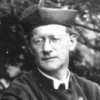
John Sebastian Marlow Ward (22 December 1885 – 1949) was an English author who published widely on the subject of Freemasonry and esotericism.
He was born in what is now Belize. In 1908 he graduated from the University of Cambridge with honours in history, following in the footsteps of his father, Herbert Ward who had also studied in history before entering the priesthood in the Anglican Church, as his father had done before him.
John Ward became a prolific and sometimes controversial writer on a wide variety of topics. He made contributions to the history of Freemasonry and other secret societies.
He was also a psychic medium or spiritualist, a prominent churchman and is still seen by some as a mystic and modern-day prophet.
Recent Articles: J.S.M Ward EAF Handbook

Book Review - The EA, FC, MM Handbooks
Essential reading for every Entered Apprentice, Fellowcraft, and Master Mason - these seminal books by J.S.M Ward are what every Mason needs!
more....
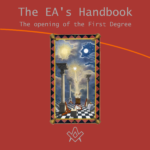 The Entered Apprentices Handbook P1 Chapter 1 - An interpretation of the first degree, the meaning of the preparation, symbolism, ritual and signs. Chapter 1, The opening of the First Degree |
 The Entered Apprentices Handbook P2 Chapter 2 - The Tyler or Outer Guard. The first thing that greets the eyes of the aspirant to our Order standing in front of the door with a drawn sword in his hand. |
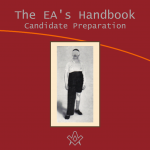 The Entered Apprentices Handbook P3 Chapter 3 - the Candidate being prepared by the Tyler. What we now have is a system by which the parts which have to be bare are made bare. |
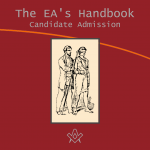 The Entered Apprentices Handbook P4 Chapter 4 - The candidate's admission into the lodge, is received on a sharp instrument. This signifies many things, one idea lying within the other. |
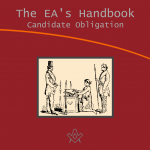 The Entered Apprentices Handbook P5 Chapter 5 - In all the ancient mysteries a candidate obligation was exacted to secure the secret teachings given in these mysteries which disclosed an inner meaning. |
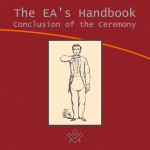 The Entered Apprentices Handbook P6 Chapter 6 - Having taken the first regular step the Candidate is given the Sign. This he is told refers to the Penalty of his Obligation, and no doubt it does, but it also seems to refer to something much more startling. |
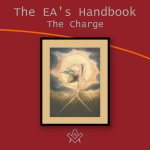 The Entered Apprentices Handbook P7 Chapter 7 - The candidate receives the charge, the first significant point is the phrase "Ancient, no doubt it is, as having subsisted from time immemorial". |
 In the second volume we are dealing with the degree of Life, in its broadest sense, just as in the first degree we were dealing with the degree of birth, and as life in reality is educational for the Soul, we are not surprised to find that throughout the whole degree the subject of education is more or less stressed. read the full series … |
 The third degree in Freemasonry is termed the Sublime Degree and the title is truly justified. Even in its exoteric aspect its simple, yet dramatic, power must leave a lasting impression on the mind of every Cand.. But its esoteric meaning contains some of the most profound spiritual instruction which it is possible to obtain to-day. read the full series … |
masonic knowledge
to be a better citizen of the world
share the square with two brothers

click image to open email app on mobile device






